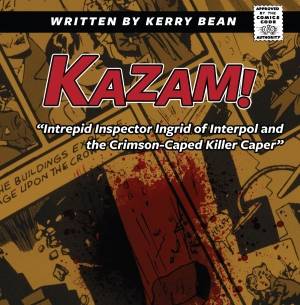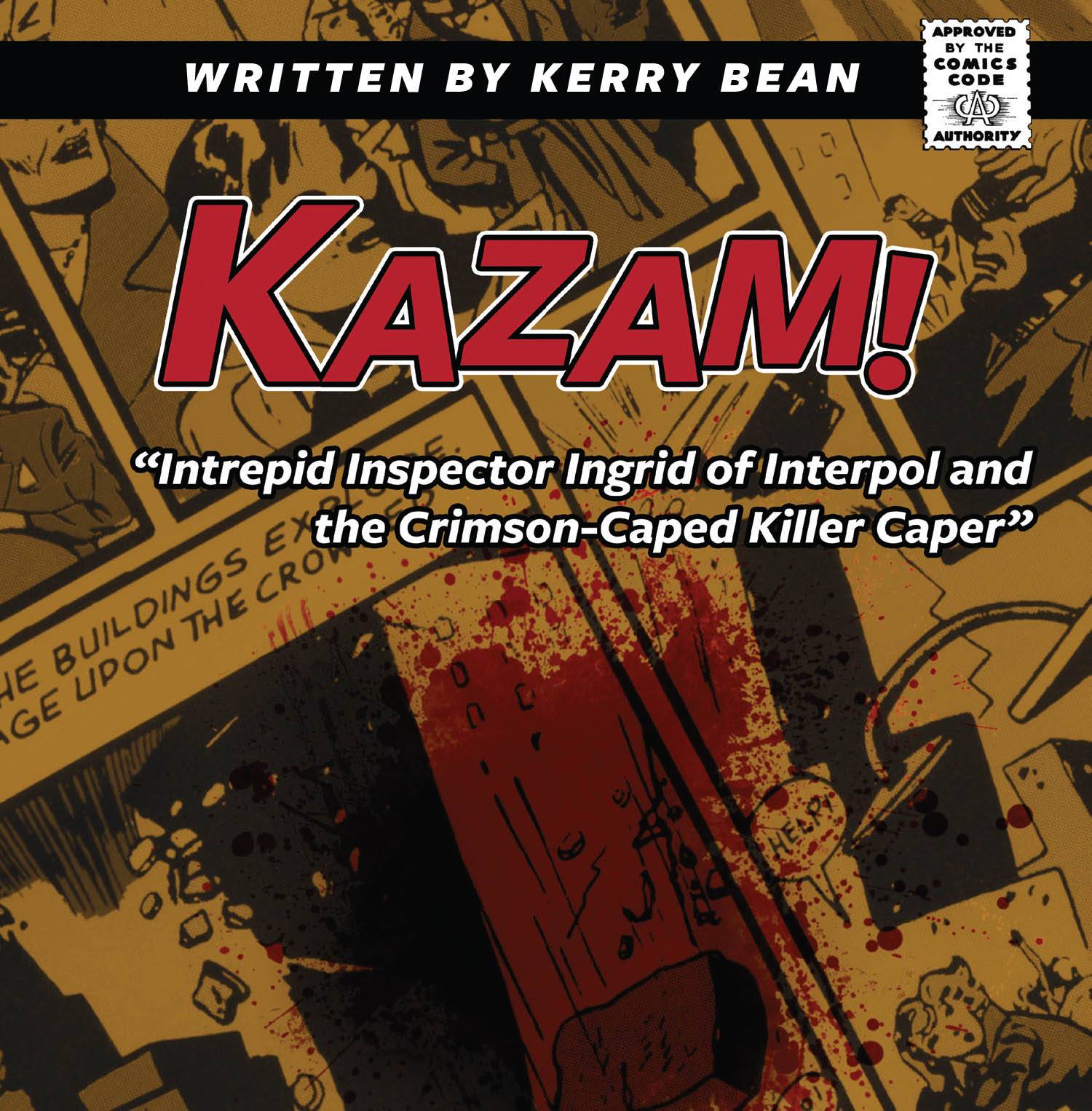Every winter, the Parkland College Theatre Department puts on a student-run production. From February 9th to the 12th, Parkland Theatre is presenting Kazam!, a “musical murder mystery melodrama”. This particular play was written by Parkland professor Kerry Bean and is being directed by Parkland College student Tyler Cook. On New Year’s Eve, 1966, at a superhero costume party, the guest of honor is a very rare first volume of a particular comic book entitled Uranium Man! Not only is it worth a lot of money, but also may contain plans to some sort of secret weapon. Over the course of the evening, various guests try to steal the comic book, which leads to dastardly characters doing dastardly things.
A unique aspect to this show is that its writer created it as an interactive experience. Every performance will end differently, and during the play, the audience will be able to guess which characters are actually the villains. Submitting a correct guess will give you a chance at winning a grand prize.
Since such a format is fairly rare, we interviewed both the writer and director of Kazam! so audiences can learn more before going to this one-weekend limited engagement.
Presented first is my interview with Kazam! writer Kerry Bean.
Smile Politely: Can you talk a little bit about what Kazam! is about and what kind of themes are explored in the play?
 Bean: I call Kazam! (and the exclamation point is unexpectedly important) a “musical murder mystery melodrama” because it really is a mash-up of all those theatrical genres all wrapped up in a great big farce.
Bean: I call Kazam! (and the exclamation point is unexpectedly important) a “musical murder mystery melodrama” because it really is a mash-up of all those theatrical genres all wrapped up in a great big farce.
Just as in a good Agatha Christie tale, we quickly meet all the characters, several of whom [are] disreputable. A malicious murder is committed and the costly comic book is stolen.
Onto the scene rush our heroes: Intrepid Inspector Ingrid of Interpol and her faithful (though mostly incompetent) assistant, Dr. Bob the Medical Examiner. Fortunately for the sake of the play, everyone is locked in the library while Ingrid and Bob try to solve the murder (and pretty much everyone else runs and hides). Hilarity, hopefully, ensues.
I can think of two themes that the astute audience member may pick up on: first, there is an absolute futility in humankind’s continuing development of more and more powerful weapons. (That is, it’s not going to turn out well.) And second, that live theatre can be funny even as it pushes the audience to the breaking point of their suspension of disbelief.
SP: Why did you want to tell this story? Where did the inspiration to write this story come from?
 Bean: The inspirations, though many, are pretty easy to list: Marx Brothers’ films like Duck Soup, the Pink Panther films, Noises Off! (the stage show is superior to the movie), and television shows ranging from Poirot to Monty Python to Saturday morning staples such as Rocky and Bullwinkle and Scooby-Doo. It’s easier to write about the 1960s when you childhood took place in the 1960s!
Bean: The inspirations, though many, are pretty easy to list: Marx Brothers’ films like Duck Soup, the Pink Panther films, Noises Off! (the stage show is superior to the movie), and television shows ranging from Poirot to Monty Python to Saturday morning staples such as Rocky and Bullwinkle and Scooby-Doo. It’s easier to write about the 1960s when you childhood took place in the 1960s!
I have been writing plays since becoming a theatre major back in Monmouth College (home of the Fighting Scots). I started dabbling in murder mysteries about seven years ago while I was serving as Pastor at First Presbyterian Church in Tolono. We presented the first play as a reader’s theatre production fundraiser at the church. The folks there were great sports and we kept creating new shows for the next four years. Always the formula was the same: wacky characters in highly improbable situations solved [mysteries] in an incredulous manner. Throw in three or four original songs and maybe even an infomercial.
Somewhere along the line, Joi Hoffsommer heard about these plays. In fact I may have thrust one on her and she was kind enough to actually read it. She liked it and took the chance of putting one of my titles into the season. So, officially, the Theatre commissioned me to write Kazam! with the specific direction to tie it in with Parkland College’s celebration of its 50th year of providing community education.
SP: What can people expect to see when they come see the show?
Bean: The director, Tyler Cook, has decided to set up the black box space as variation of an arena or thrust stage, with audience seating on two sides; he’s intent on creating a very close connection between the actors and the audience. Folks may be surprised to see a Narrator and Greek Chorus included in the story-telling. (Less so, I guess, if they read this article). Settings will be minimal though evocative of the period and its comic book artistic genre. Lots of costumes! Since it’s called the Crimson-Caped Killer Caper, it follows that almost every character wears a red cape at one time or another. Light cues and sound cues galore. And every literary use of humor I could think of including irony, slapstick, and a bevy of unforgivable puns. (There’s even a geography joke, if that’s your thing.)
SP: Are you pleased with the way the show is turning out?
Bean: So far, so good for the production process. The cast is great and Tyler (with help from faculty adviser Jacki Lowenstein) is really pulling all of the disparate parts of this script into entertaining, fast moving whole. He’s very much putting his own stamp on the show, which is exciting to see.
It’s hard to believe that the show opens so soon. I’ll be there and I’ll be laughing the loudest because I’m a really big fan of my own writing!
Following is my interview with student director Tyler Cook.
SP: Why did you decide to direct this particular show?
 Cook: Despite mostly working onstage as an actor in the past, I have particularly always had an interest in what brings a show together, the process that brings all sorts of separate parts (lighting, sound, set, etc.) together into a singular, unique experience. Ever since I was a kid I was always looking into how my favorite movies and shows were made, and theatre is no exception. So when it was announced for this season that the student production was a full-length show (and an original one no less!), I jumped right on board with the opportunity.
Cook: Despite mostly working onstage as an actor in the past, I have particularly always had an interest in what brings a show together, the process that brings all sorts of separate parts (lighting, sound, set, etc.) together into a singular, unique experience. Ever since I was a kid I was always looking into how my favorite movies and shows were made, and theatre is no exception. So when it was announced for this season that the student production was a full-length show (and an original one no less!), I jumped right on board with the opportunity.
SP: What has been challenging about directing Kazam!? What kind of experience has it been? What have you learned?
Cook: One of the most challenging things so far with directing Kazam! has been balancing the responsibilities of both a director and a working student, as well as scheduling meetings and rehearsals. The designers are all students (as well as a good chunk of the cast), so they had to overcome a similar challenge, and I never realized how hard it can be sometimes to work around individual schedules to get everyone in the same room to discuss concerns and progress. Another challenge was dealing with a much different space than the traditional proscenium stage. Since this show is in the Second Stage black box theatre, we had to use a much different type of staging, and we couldn’t use a lot of set pieces. It was an interesting learning experience in trying to figure out where to place the minimal set pieces, as well as actors to use the space efficiently.
SP: Is being a director something you want to do as a career? Would you like to direct something else?
Cook: While in the past I was a little uncertain of becoming a director, this experience has definitely influenced me to continue working in theatre. While I am still a little uncertain if I would want to become a director full-time, it is definitely a strong consideration now! I would love to direct another show at some point in the near future (preferably another comedy, or perhaps even a musical)!
If you are interested in seeing Kazam!, you can attend a performance at Parkland Theatre on February 9th, 10th, and 11th at 7:30 p.m. and on February 12th at 3:00 p.m.. To reserve tickets, you can email Parkland Theatre at [email protected] or call 217-351-2528. For more information, you can visit Parkland Theatre’s website.
Jordan Kreie is a recent college graduate with a Bachelor’s degree in English. When he is not writing articles for the Arts section of Smile Politely, he is watching movies and writing film criticism. You can find him on twitter @jordankreie or read more of his work on his blog.








